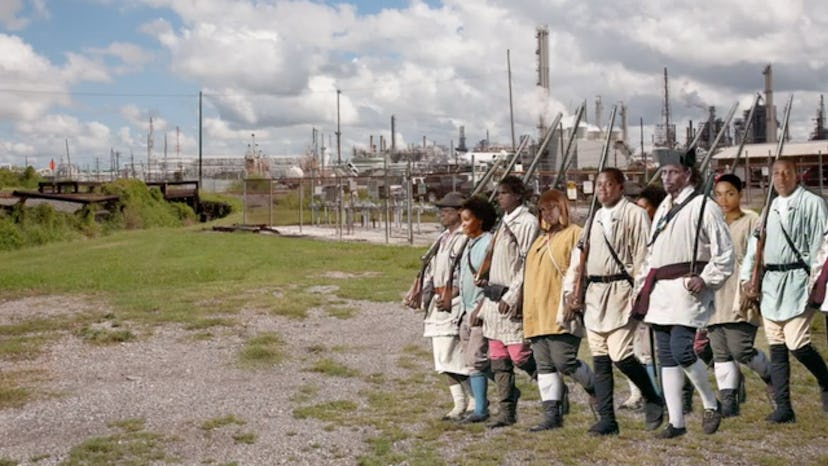Artist Dread Scott’s Slave Rebellion Reenactment Is Not Just About Slavery
Artist Dread Scott’s Slave Rebellion Reenactment will present a performative reenactment of the largest slave revolt in North American history.

The artist Dread Scott is partnering with the New Orleans-based art organization Antenna to reenact the Louisiana German Coast Uprising of 1811, when a collective of up to 500 armed slaves marched from plantations towards New Orleans in what became the largest slave rebellion in North American history. Dread Scott’s Slave Rebellion Reenactment is slated to occur in November 2018, after the goal of crowdsourcing $40,000 has been reached.
In a phone conversation, Dread Scott explained that after researching multiple revolts and rebellions, he settled on the suppressed story of the 1811 Uprising that took place in Louisiana Territory. “This project is not about slavery and it’s not about oppression, it’s about people who’ve shaken off oppression and are trying to emancipate themselves the only way they can, and that’s by ending slavery,” said the artist.
While Civil War reenactments are a popular southern tradition, slavery revolts are seldom dramatized as public performance, and certainly not to this degree. The performance will include at least 500 black people, “many on horses, armed with machetes and muskets, flags flying, some in militia uniforms, others in 19th century French colonial garments, singing in Creole to African drumming,” as they march along the Mississippi River, no longer a site known for its plantations and slave-owners, but now recognized for its stratums of industry and suburban residential life, as various as oil refineries, gated communities, and low-income housing. According to the performance’s Kickstarter page, the goal is to startle spectators, so that “the historical confluences between past and present will create an ever-shifting dialogue that encourages viewers to re-think long-held assumptions.”
The 1811 uprising was not violent until its very end, and Scott does not plan to not glorify the violence and death that did actually occur. “I don’t want to reenact a bunch of white people slaughtering a bunch of black people,” declared Scott. The reenactment will not include the rebellion’s tragic finale, and will instead indulge in the spirit of emancipation and culminating in a musical celebration, giving an alternate ending to the revolt. On the subject of alternate histories, Scott finds them to be important, but is cautious of some contemporary retellings of the past. In fact, his initiative to open up a dialogue about race and untold histories in America could not be more timely.
As Hollywood catches flak for its ever-growing issue with a lack of diversity in its writers’ rooms, viewers are not happy that one of the few stories which carefully represented vital portions of untold history—WGN America’s historical period drama Underground—has been canceled and will not be re-homed to a new network, while HBO moves forward with Confederate—a drama taking place in an alternate timeline where slavery is still an institution under the successful secession of the South from the Union—despite backlash from writers, actors, and artists across the board. A performance that aims to disrupt the Slave Rebellion Reenactment is a necessary act of resistance.
Having not yet seen HBO’s Confederate, Scott still finds himself wary of the implications of telling a story that might work to strengthen the legacy of white supremacy. “It’s conceivable that one could make a searing indictment of present-day America by telling a story of ‘What if the South won?’ but I doubt that’s what they’re actually going to do,” he told W.
In regards to contemporary portraits of racial politics in America, Scott hopes that the Slave Rebellion Reenactment will touch a nerve and open up space for more conversations that focus on acts of resistance. “You have a situation where major sports celebrities are protesting white supremacy by kneeling during the National Anthem and the president is demanding that they be fired for doing that. The question of race and the legacy of the system in a society that was founded on slavery is very much being discussed at present,” declared Scott. Looking not only to the past for inspiration, Scott looks towards the future, also citing the trend of Afrofuturist projects in contemporary art as inspiration for the performance, a medium which allows him to draw threads between the past and the present.
Scott believes the performance will “propose a profound challenge to white supremacy in the present… There will be a deep resonance for people for whom the shadow of slavery is very long in that region.” He also sees New Orleans—where the reenactment will take place—as a city that is often bolstered by its hefty tourist economy while remaining a complex site of contradictions. “One of the things many tourists do is they go to slave plantations. These are sites where genocide happened, yet people are having their wedding photos taken in them. I just can’t imagine going to Auschwitz and saying, ‘Let’s take our wedding photos here.’ That just wouldn’t happen,” said Scott. The goal of this community-wide performance will be to open up space for wider conversations about the mythologies and legacies perpetuated by the underreported histories of the American south.
Related: Colin Kaepernick’s Jersey Is Now Hanging In MoMA
See W’s most popular videos: